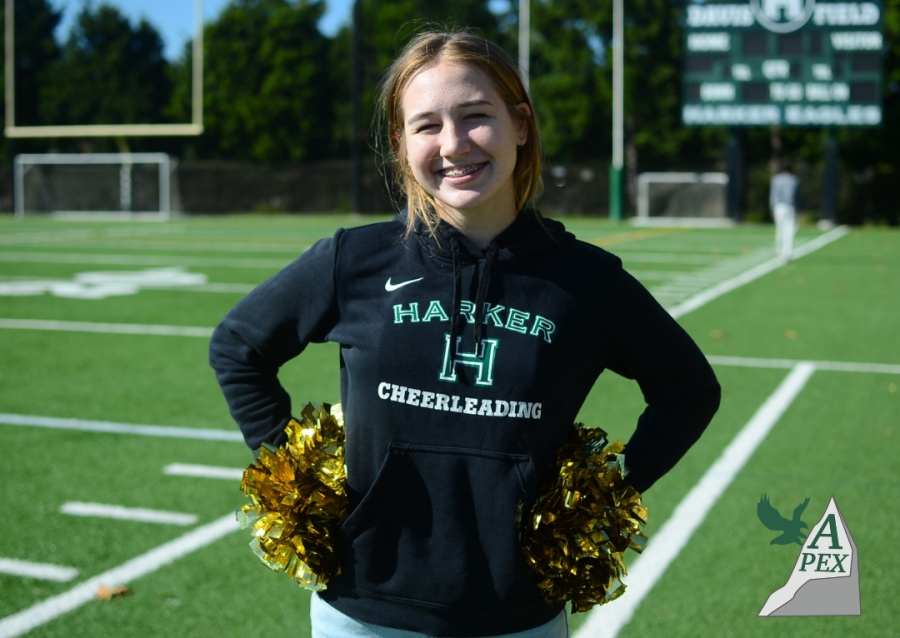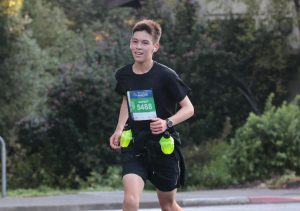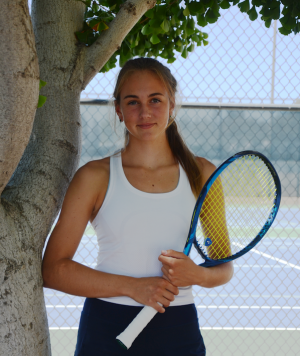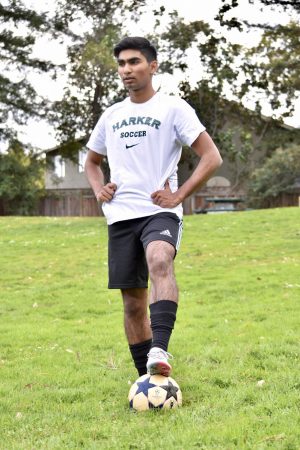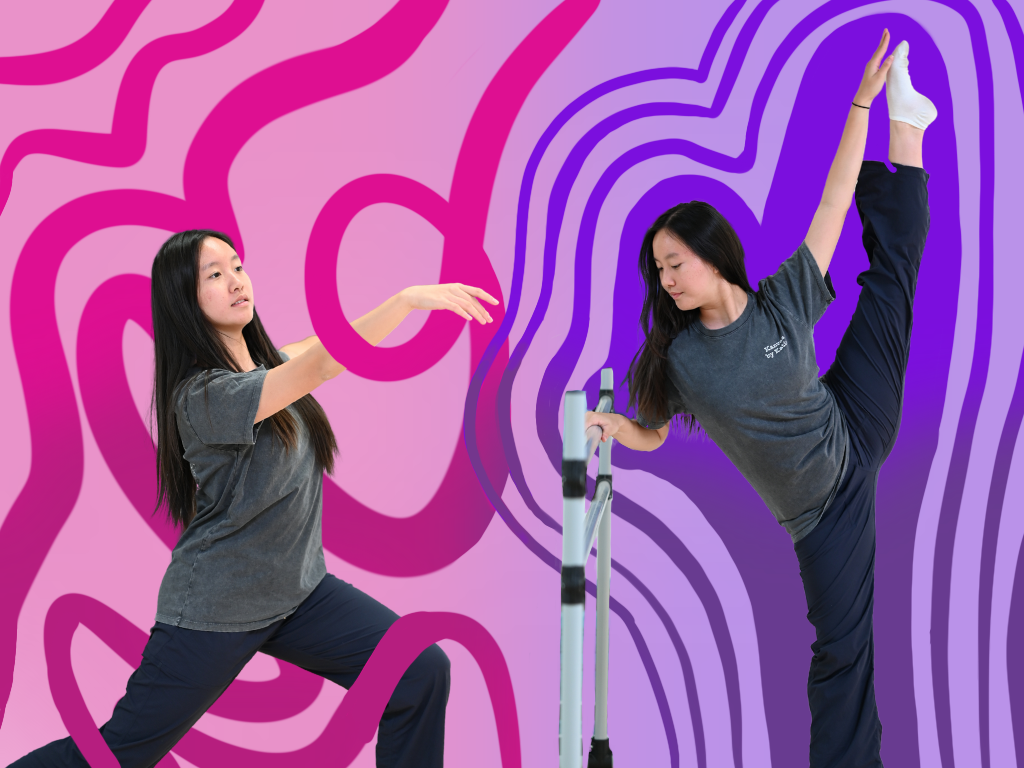Apex: Cheerleader defines grit of sport through commitment
Imogene Leneham (12) overcomes injury to embrace the challenges and rewards of cheer
Julie Shi
Imogene Leneham (12) poses on Davis Field with gold pom-poms. As captain of Harker’s cheerleading team this year, Imogene is in charge of choreographing sections of new routines and teaching them to her fellow cheerleaders.
December 4, 2021
Upbeat music pumps through the air as Imogene Leneham (12), captain of Harker’s varsity cheerleading team, performs with her cheer members at Harker’s 2021 Spirit Rally. Imogene leaps into the air in her middle splits and then follows with a series of sharply executed moves, a smile on her face as she dances to the beat of the music.
Imogene’s passion for performance first drew her towards cheerleading as a child. In her freshman year, Imogene joined Harker’s varsity cheerleading team, which she has continued up to her senior year.
“I really enjoy just performing any sort of [act],” Imogene said. “To be honest, [I enjoy] just that energy from crowds and being able to learn something and showcase it.”
But Imogene’s journey through cheer has not always been easy. During her first two years on the cheer team, she continued to deal with knee pain that had begun bothering her in seventh grade. Since the exact problem behind the pain was unknown, Imogene tried many different braces and taping methods for her knee to attempt to alleviate the pain. The braces and athletic tape were often short-term solutions, becoming useless after a day’s wear.
Yet, Imogene never let the pain in her knee stop her from going to practice.
“It was just progressively getting more painful to do anything,” Imogene said. “But I would just kind of shrug it off and be like, ‘I’m fine,’ and try to keep going even though I was in pain, just because I wanted to be able to still do everything.”
At the start of her sophomore year, the pain in her knee dramatically worsened – it hurt just to walk, or to climb stairs.
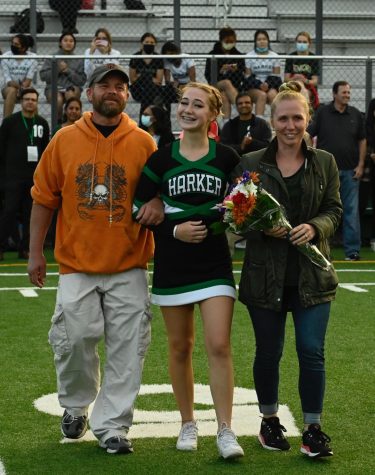
Just before winter break, Imogene was diagnosed with a benign tumor right below her knee. Had the tumor been left to grow anymore, it would have shattered her knee and forced her to have an entire knee replacement. Imogene immediately underwent surgery and spent the winter break recovering.
“[The surgery] gave me a chance to just be grateful that they could figure out what was wrong with me,” Imogene said. “Because the pain had been going on for so long and was so excruciating, just knowing that they were going to fix it helped a lot mentally — being able to be like ‘I will get back to cheer eventually, just it’s going to take time.’”
Imogene returned to school on crutches after winter break ended, but she still had to wait for her knee bone to grow back to the point where she would be able to engage in vigorous physical activity without damaging it further. Although Imogene couldn’t participate in physical cheer activities, she still sat in on every practice and game, trying her best to help her cheer members from the sidelines.
“When I make a commitment to something, I very much try to stick to it to the best I can, and cheer is something I really enjoy and that I love, so I wanted to be there for my teammates and still be able to be there for the sport even though I couldn’t participate,” Imogene said.
In a month and a half, Imogene’s knee completely recovered, and she was elated to be able to cheer once again. But just a couple of months after her knee healed, the COVID-19 pandemic struck, lasting throughout the rest of Imogene’s sophomore year and her entire junior year. Cheerleading practice was held over Zoom, and there were no performances during the year, throwing another wrench into Imogene’s hopes to begin cheer again.
So when school reopened Imogene’s senior year and cheer returned to its traditional in-person format, Imogene was excited to return to cheer — this time, as the cheer team’s captain.
“She is not afraid to take charge in a very positive way,” said cheerleading head coach Angelina Metsers, who chose Imogene for the leadership and dependability she demonstrated in her first three seasons. “I can depend on her to teach things or create parts of routines for the team and go above and beyond outside of practice to make sure that other team members are aware of the material.”
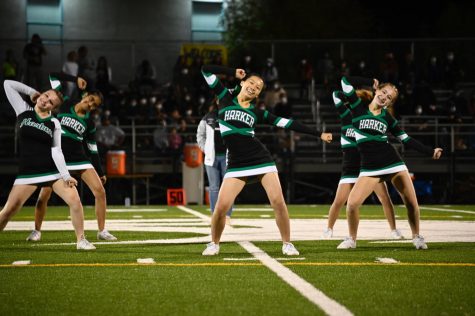
As captain, Imogene choreographs sections of the routines on her own and teaches it to the other cheerleaders during practice. She also communicates regularly with her team members, both to relay logistics of practices and performances as well as to make sure they have the support they need during cheerleading.
Throughout her years as a cheerleader and then as the captain of the cheerleading team, Imogene has learned the ins and outs of cheerleading — both the technical skill and strength required to perform routines and the mental focus behind every performance. So when people say cheerleading doesn’t count as a real sport, Imogene strongly disagrees.
“Cheerleading is definitely a sport,” Imogene said. “Anything that [involves a lot of] activity and that you can compete in, win awards in, is a sport. When people don’t consider cheerleading a sport, it is a little frustrating.”
Similar to traditional sports, cheerleading also holds a vigorous physical aspect to it, according to Imogene. Cheerleaders develop muscle strength through learning stunts, as the entire process of lifting a cheerleader into the air and keeping them upright can be exhausting for both flyers and bases.
“It’s all very fast-paced, so when we do [stunts], it gets really tiring, especially in routines when we have [to go] from jumps to a stunt or from the dance part to stunts,” Imogene said.
Because of the intense physical involvement required to perform stunts routines, especially after her knee surgery, Imogene became aware of the importance of balancing passion for cheerleading with taking care of her own health.
“Don’t pressure yourself. If you’re feeling discouraged, it’s okay to take breaks sometimes,” Imogene said. “That’s what I really struggled with, trying to please the coaches and everyone else because they wanted me to get the skill. But [you should also] listen to yourself and make sure you know what your body wants and what you mentally can do.”
Apex is Harker Aquila’s feature profile repeater on upper school athletes.


















![“[Building nerf blasters] became this outlet of creativity for me that hasn't been matched by anything else. The process [of] making a build complete to your desire is such a painstakingly difficult process, but I've had to learn from [the skills needed from] soldering to proper painting. There's so many different options for everything, if you think about it, it exists. The best part is [that] if it doesn't exist, you can build it yourself," Ishaan Parate said.](https://harkeraquila.com/wp-content/uploads/2022/08/DSC_8149-900x604.jpg)




![“When I came into high school, I was ready to be a follower. But DECA was a game changer for me. It helped me overcome my fear of public speaking, and it's played such a major role in who I've become today. To be able to successfully lead a chapter of 150 students, an officer team and be one of the upperclassmen I once really admired is something I'm [really] proud of,” Anvitha Tummala ('21) said.](https://harkeraquila.com/wp-content/uploads/2021/07/Screen-Shot-2021-07-25-at-9.50.05-AM-900x594.png)







![“I think getting up in the morning and having a sense of purpose [is exciting]. I think without a certain amount of drive, life is kind of obsolete and mundane, and I think having that every single day is what makes each day unique and kind of makes life exciting,” Neymika Jain (12) said.](https://harkeraquila.com/wp-content/uploads/2017/06/Screen-Shot-2017-06-03-at-4.54.16-PM.png)








![“My slogan is ‘slow feet, don’t eat, and I’m hungry.’ You need to run fast to get where you are–you aren't going to get those championships if you aren't fast,” Angel Cervantes (12) said. “I want to do well in school on my tests and in track and win championships for my team. I live by that, [and] I can do that anywhere: in the classroom or on the field.”](https://harkeraquila.com/wp-content/uploads/2018/06/DSC5146-900x601.jpg)
![“[Volleyball has] taught me how to fall correctly, and another thing it taught is that you don’t have to be the best at something to be good at it. If you just hit the ball in a smart way, then it still scores points and you’re good at it. You could be a background player and still make a much bigger impact on the team than you would think,” Anya Gert (’20) said.](https://harkeraquila.com/wp-content/uploads/2020/06/AnnaGert_JinTuan_HoHPhotoEdited-600x900.jpeg)

![“I'm not nearly there yet, but [my confidence has] definitely been getting better since I was pretty shy and timid coming into Harker my freshman year. I know that there's a lot of people that are really confident in what they do, and I really admire them. Everyone's so driven and that has really pushed me to kind of try to find my own place in high school and be more confident,” Alyssa Huang (’20) said.](https://harkeraquila.com/wp-content/uploads/2020/06/AlyssaHuang_EmilyChen_HoHPhoto-900x749.jpeg)



